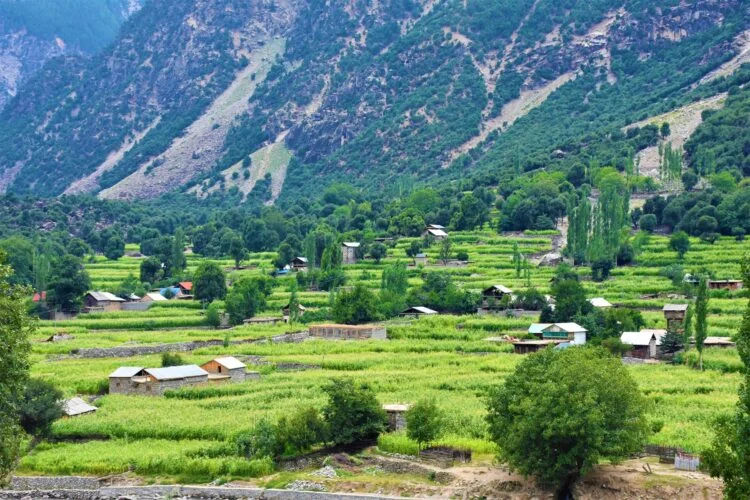Tangir Bala & Tangir Payeen – Exploring the Heart of Tangir Valley!
The remote Tangir Valley in Gilgit-Baltistan is divided into two distinct regions:
Tangir Bala (Upper Tangir)
Tangir Payeen (Lower Tangir)
Though part of the same valley, these areas offer different elevations, lifestyles, and terrains, making it essential for any traveler, researcher, or cultural explorer to understand both. As you ascend from Tangir Payeen’s warmer river gorges to Tangir Bala’s lush mountain slopes, you’ll experience a transition from rugged terrain to alpine beauty, all while meeting some of the most resilient and hospitable people in Gilgit-Baltistan.

Why Visit Tangir Bala & Payeen?
For those who want to go beyond the tourist trail and experience raw, unfiltered life in the mountains, Tangir Bala and Tangir Payeen are powerful destinations. You’ll find not only stunning natural beauty but also stories, traditions, and values untouched by modern tourism. It’s a place where the river still dictates life, where community means survival, and where every rock has a tale.
Routes to Tangir Bala & Tangir Payeen
Location & Orientation
Region: Tangir District (previously Diamer), Gilgit-Baltistan
From Chilas (KKH):
Tangir Payeen: ~45 km (~1.5–2 hours)
Tangir Bala: ~60–65 km (~2.5–3.5 hours, steep ascent)
Access Road: Via Tangir Road, a 4×4-only rugged mountain route
Main Water Source: Tangir River, flowing from Bala to Payeen into the Indus River
Tangir Payeen – The Lower Gateway
Overview:
The first part of Tangir Valley you enter after leaving Chilas
Closer to the Indus River and relatively warmer, with rocky terrain
Contains government offices, basic markets, and medical units
Main administrative and logistical hub of the valley
Landscape & Lifestyle:
Dry, semi-mountainous terrain with traditional terraced fields
Locals practice farming (maize, wheat), and small-scale livestock
Houses are made of wood and mud, closely clustered
Conservative tribal customs dominate life here
Limited shops, schools, and a growing focus on education
 Travel Notes:
Travel Notes:
Roads are narrow and often cut through steep cliffs
Best visited in summer months due to rough conditions in winter
Can be crowded during tribal Jirga sessions or elections
Tangir Bala – The Upper Valley Highlands
Overview:
Located deeper in the mountains, above Tangir Payeen
Cooler, greener, and more scenic, with pine forests and pastures
Known for its peaceful environment, alpine beauty, and hiking trails
Less developed but richer in natural resources and traditional life
Landscape & Culture:
Surrounded by high ridges, dense forests, and flowing glacial streams
Agriculture includes apples, walnuts, potatoes, and seasonal crops
Livestock herding is common; you’ll often see sheep/goats along trails
Villages are more spread out with wooden architecture
Locals have a deep connection to the land and mountain traditions
Activities in Tangir Bala
| Activity | Details |
|---|---|
| 🌲 Forest Hiking | Walks through alpine meadows & pine slopes |
| 📷 Cultural Photography | Traditional tribal attire & wooden homes |
| 🐑 Village Life Experience | Stay with locals, help in farms or herding |
| 🕌 Heritage Mosques | Small, wooden mosques hidden in hill villages |
Best Time to Visit
| Season | Notes |
|---|---|
| May–September | Ideal for both Bala and Payeen – clear roads, pleasant weather |
| October–November | Autumn beauty, but nights get cold in Bala |
| December–April | Snowfall in Bala, potential roadblocks – risky travel |
Travel Advisory
4×4 vehicle required — roads are narrow, unpaved, and occasionally dangerous
Bring cash, water, fuel, and basic medicines — no ATMs or clinics in upper villages
Inform local elders or police post before extended exploration
Dress modestly and follow local etiquette – it’s a tribal, conservative area
No mobile coverage in most upper parts (use satellite or offline maps)
Local Food
Try local dishes like:
Chapshuro (meat-filled bread)
Sharbat (dried apricot juice)
Trout Fish (fresh from local rivers)
Butter tea & organic yogurt
Must-know things!
- Sleeping Mask & Ear Plugs: Warm Shawl/Lightweight Jacket.
- Gadgets & ChargersBook & Notepad.
- Mints, Sanitizer, Wet Wipes & Tissue paper.
- Toiletries.
- Snacks.
- Hiking boots/Sturdy Joggers.
- Cargo Pants/Hiking Trouser.
- Hat, Sunglasses, Sunblock.
- Refillable Water Bottle.
- Snacking Bars/Dry Fruits.
Traveler Tips
Fuel Up in Gupis or Gilgit – no petrol stations in Golaghmuli
Mobile Network: Limited; only SCOM works in some areas
Permits: No NOC needed for Pakistani tourists. Foreigners might need NOC from Gilgit.
Weather Gear: Even in summer, nights are cold – bring layers
Altitude Sickness: Stay hydrated, ascend gradually